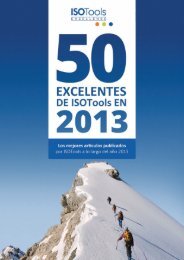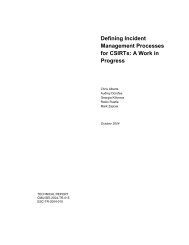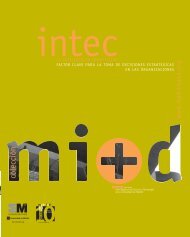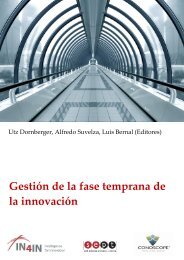The Global Innovation Index 2012
The Global Innovation Index 2012
The Global Innovation Index 2012
Create successful ePaper yourself
Turn your PDF publications into a flip-book with our unique Google optimized e-Paper software.
Malta is ranked 16th in the GII<br />
<strong>2012</strong> and is 1st among the 16 countries<br />
added to the GII this year.<br />
Malta achieves 4th position in the<br />
Output Sub-<strong>Index</strong>. Its 1st rank in<br />
creative goods and services, with<br />
good scores across all indicators, is<br />
in large measure the reflection of its<br />
appeal as a tourist destination, which<br />
has a direct impact on the production<br />
and consumption of recreation<br />
and culture. Although labour productivity<br />
is still low at 0.5% (ranked<br />
99th), Malta achieves 5th and 6th<br />
positions in new businesses and the<br />
adoption of certificates of conformance<br />
with the ISO 9001 quality<br />
standard, leading to 10th position in<br />
knowledge impact. <strong>The</strong> country’s<br />
two major strengths, however, are its<br />
3rd and 6th positions in knowledge<br />
absorption and diffusion. <strong>The</strong> major<br />
areas of concern are its low rankings<br />
in Human capital and research and<br />
in investment.<br />
Estonia ranks 19th (18th among<br />
GII 2011 countries), up from 23rd<br />
in 2011 and 8th in the Output Sub-<br />
<strong>Index</strong>. After averaging an 8.3%<br />
growth in GDP in 2000–07, Estonia<br />
experienced two years of recession,<br />
with a drop in GDP of 14.3% in<br />
2009 but an estimated 7.6% growth<br />
in 2011.25 In its GII results, the country<br />
shows real strength on the outputs<br />
side and is firmly placed at the<br />
frontier of innovation learners and<br />
leaders, outperforming all countries<br />
with similar income levels in<br />
per capita PPP$: it ranks 8th on the<br />
efficiency ratio, 13th on Knowledge<br />
and technology outputs, and 9th on<br />
Creative outputs. <strong>The</strong> leverage there<br />
comes from two sub-pillars: first,<br />
Estonia places 18th in knowledge<br />
creation. Second, the country places<br />
2nd in knowledge impact, reflecting<br />
the dynamism of its economy with<br />
a growth rate of labour productivity<br />
of 8.6% (ranked 4th), and taking<br />
7th place in the establishment of new<br />
businesses and the 12th position in<br />
the adoption of the ISO 9001 quality<br />
standard. Another area of relative<br />
strength is its high level of adoption<br />
of the latest technologies and<br />
online creativity, with a 1st position<br />
in Wikipedia and 12th on YouTube<br />
video uploads. A deeper financial<br />
market and improved innovation<br />
linkages will be needed for Estonia<br />
to benefit fully from its strong output<br />
positions.<br />
Top performers by income group<br />
Identifying the underlying conditions<br />
of a country and comparing<br />
performances among its peers is vital<br />
to a good understanding of the implications<br />
of a country’s ranking in the<br />
GII. This report attempts to abide by<br />
this underlying principle by assessing<br />
results on the basis of the development<br />
stages of countries (captured<br />
by the World Bank income classifications).<br />
High-income top performers<br />
are discussed in detail in the previous<br />
section (Box 2).<br />
Upper-middle-income countries<br />
(40 economies)<br />
Among upper-middle-income<br />
countries, the best performers in the<br />
GII <strong>2012</strong> are Latvia (30th), Malaysia<br />
(32nd), China (34th), Lithuania<br />
(38th), Chile (39th), Bulgaria (43rd),<br />
Montenegro (45th), Serbia (46th),<br />
Mauritius (49th), and the Russian<br />
Federation (51st).<br />
In the Input Sub-<strong>Index</strong>, the<br />
best performers are Malaysia (29th),<br />
Latvia (36th), Lithuania (38th),<br />
Chile (43rd), South Africa (45th),<br />
Bulgaria (47th), Montenegro (48th),<br />
Mauritius (49th), Romania (51st),<br />
and the former Yugoslav Republic<br />
of Macedonia (52nd).<br />
In the Output Sub-<strong>Index</strong>, the<br />
best performers are China (19th),<br />
Latvia (27th), Chile (34th), Serbia<br />
(36th), Lithuania (37th), Malaysia<br />
(38th), Bulgaria (42nd), Montenegro<br />
(44th), Jordan (46th), and Mauritius<br />
(48th).<br />
Latvia is ranked 30th (29th<br />
among GII 2011 economies), up<br />
from 36th place in 2011 and topping<br />
the rankings among upper-middleincome<br />
countries. As for Estonia,<br />
this is commendable because Latvia<br />
was one of the countries hardest<br />
hit by the economic crisis, subject<br />
to three recession years in 2008–<br />
10 and the biggest drop in GDP in<br />
the world in 2009 (–17.7%), but it<br />
has been steadily recovering since.<br />
Latvia places in the top 30 positions<br />
in the Output Sub-<strong>Index</strong> (27th),<br />
Institutions (30th), Market sophistication<br />
(22nd), and Creative outputs<br />
(21st). It displays relative weaknesses<br />
in the Input Sub-<strong>Index</strong> (where it<br />
places 36th), Human capital and<br />
research (50th), Infrastructure (38th),<br />
Business sophistication (53th), and<br />
Knowledge and technology outputs<br />
(37th). It is the only upper-middleincome<br />
country in the top 30 this<br />
year, also a result of the fact that it<br />
recently dropped in classification<br />
from high income to upper-middle<br />
income in the 2011 World Bank<br />
classification.<br />
Malaysia comes first among<br />
upper-middle-income economies<br />
in Asia, ranking 32nd (31st among<br />
GII 2011 countries, the same rank<br />
as in 2011). Its major strengths are<br />
in Market and Business sophistication<br />
(where it ranks 14th and 11th,<br />
respectively), while it needs to make<br />
improvements in its institutional<br />
framework (55th) and in Human<br />
capital and research (42nd) to move<br />
up in the rankings. Regarding the<br />
latter, deficiencies are found at the<br />
primary and secondary levels mainly<br />
(74th), in contrast to a highly competent<br />
tertiary education system<br />
(10th globally, 3rd in Asia) that has<br />
attracted foreign students (with a<br />
tertiary inbound mobility of 5.8%,<br />
19<br />
THE GLOBAL INNOVATION INDEX <strong>2012</strong> 1: <strong>The</strong> <strong>Global</strong> <strong>Innovation</strong> <strong>Index</strong> <strong>2012</strong>






